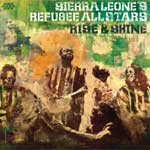The much-anticipated second album from Sierra Leone’s Refugee All-Stars is a celebration of life, music, and overcoming adversity. Recorded both in Freetown, Sierra Leone and New Orleans, Louisiana, the album blends a multitude of styles and sounds within its thirteen tracks. The addition of New Orleans brass-section work contributes to an already compelling mix of roots reggae and Sierra Leonie traditional styles. These musics share common roots, and come together in a globalized fusion that solidifies the identity of these well-traveled musicians. Serving as cultural ambassadors for post-war Sierra Leone—refugees no longer—The All-Stars have toured the world several times and are about to embark on a US tour in support of their new album.
It’s a perfect match both musically and philosophically for The All-Stars to team up with some of New Orleans best horn players. Both groups of musicians have dealt with losing their homes and livelihoods. That resiliency comes through in the melancholy downtrodden vibe of songs like “Bend Down the Corner” and “Dununya” as well as upbeat tracks like “Tamagbondorsu” and “Jah Come Down.”
“Bend Down the Corner,” a slow, bluesy, emotional song featuring acoustic guitar, call-and-response harmonized vocals, and harmonica is one of my favorite tracks on the album. Various percussive sounds, drums, hammers, nails being pounded, allude to the greater theme of rebuilding, both physically and emotionally. The harmonica embodies the blues' therapeutic effect, using pain and sorrow as inspiration.
“Jah Come Down” is a more upbeat, lively energetic reggae track that prominently features the brass section. The lyrics match the uplifting vibe of the music, telling listeners, “When your hand is in the lion’s mouth, take it easy and pull it out. Don’t let it bite your hand.” Slavery is also a theme emphasized in the lyrics of the song, “They took my people away into slavery, why’d they do that?” which is particularly interesting considering the lineages of the musicians.
Sierra Leone was one of the first places Portuguese mariners made contact on the African continent in 1462. A fort and trading post for slaves was soon established thereafter which acted as an important trading point for African slaves. British, French and Dutch slave traders all used the fort as a launching point for their slave ships. Many of the slaves that left Africa via Sierra Leone arrived in the new world via New Orleans harbor. It was in places like Congo Square in New Orleans that early and important manifestations of African-American culture first sounded. The two cultures have come full circle to be reunited throughout this album. It’s no surprise that the styles blend so seamlessly when one considers the history of how they’ve evolved.
Sierra Leone Refugee All-Stars ability to use their harrowing experiences as inspiration for truly beautiful music sends a powerful message to the rest of the world. What I love the most about this album is the happy, upbeat mood they convey while still managing to include the other end of the spectrum. They don’t shy away from telling their traumatic story of poverty, war, violence and exile as refugees. On the contrary, they use it as inspiration to create something truly beautiful and to educate the rest of the world in an effort to prevent such atrocities from occurring in the future. The All-Stars embody the philosophy of Japanese scholar Kenji Miyazawa: “We must embrace pain and burn it as fuel for our journey.”
~Marc Gabriel Amigone www.afrobeatblog.blogspot.com www.marcamigone.blogspot.com www.djafromarc.podomatic.com









